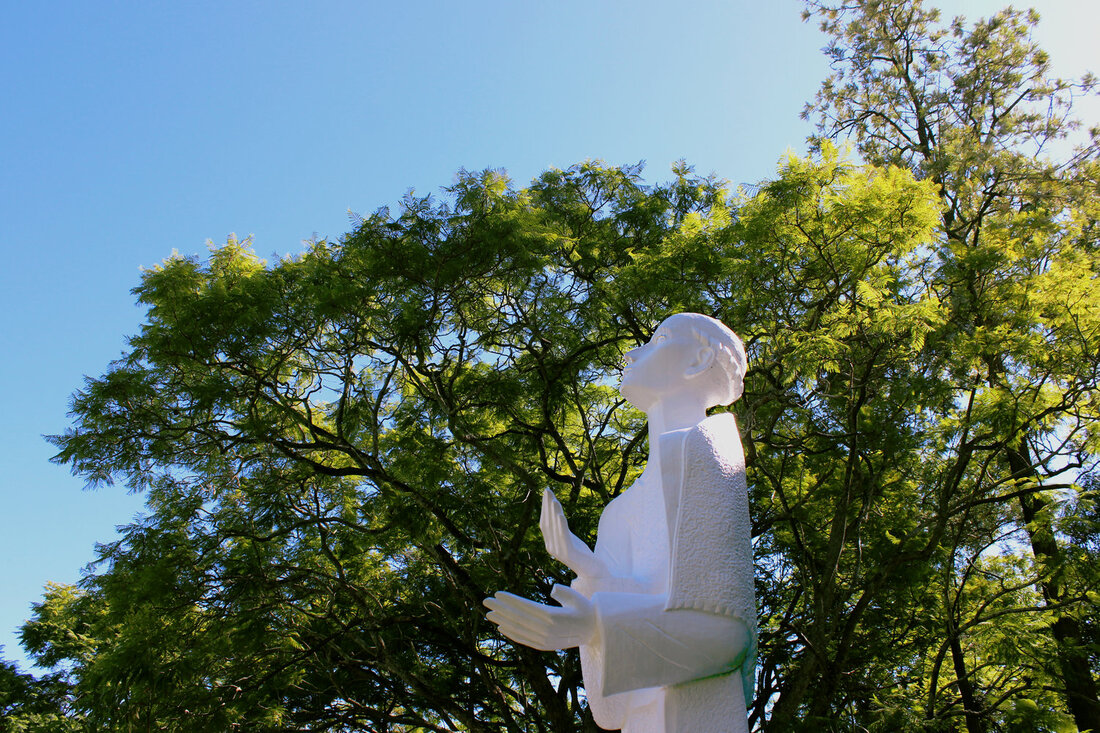
He began life as the son of a wealthy merchant, one of the ‘wise and intelligent’ in the terms of today’s gospel. He was by all accounts a spirited and rebellious youngster, who enjoyed the finer things of life. However certain events triggered a profound conversion of life for him - he was wounded in war; he encountered a leper and was moved with compassion for him; he had a spiritual experience of God speaking to him directly and urging him to build the church, which became focused for him in the reconstruction of the ruined church of San Damiano. He attempted to use his father's wealth to do this, but his father, believing he had gone mad, took him to court, and eventually disowned and disinherited him, such that Francis actually removed even the clothes he was wearing, refusing to own anything of his father's, and from that moment on embraced a life of poverty. In the most dramatic way, he expressed a ‘rebirth’– a return to infancy.
Choosing poverty in various ways has long provided an answer to the question of 'how much is enough?' Once an individual or group decides no longer to invest in protecting themselves from loss by seeking more possessions, more prestige, more security, they are liberated to engage more deeply with God. Voluntary poverty is a tool to release us from entanglement in the clutter of life, that keeps us distracted from what is essential. It frustrates our ego's constant clamour for material comfort and security. And Francis embraced it to the full.
Francis adopted the rough clothing of a beggar, and if he came across a beggar dressed more poorly than he was he would immediately swap clothes with them. He wrote, 'I think the great Almsgiver would account it a theft in me did I not give that I wear unto one needing it more.' Francis begged for everything - for stones for the church building, for oil for the candles and for his own food - and he insisted that the monks who followed him did the same. By doing this he deliberately put himself in the position of 'a worthless slave', as Jesus described the true disciple, and emphasised total dependence on God.
To Francis the shame of being a beggar was essential, in order to break the human notion of being in control. Indeed, he would not even allow his monks to soak beans overnight to cook the next day, because this would take them out of their reliance on God for the next meal. He saw that it was but a small step from soaking beans, to starting to scan the larder shelves and getting caught in providing stock for the next week. Francis took the 'daily ' in 'give us this day our daily bread', absolutely literally.
We may feel that Francis is just too radical for us, and that we cannot possibly live up to his demands. Yet his example can spur us to review our lives and our priorities and reconsider what our 'enough' might be. If the point is to have enough space in our lives for prayer and praise; for taking long walks that lift the heart and delight our animal companions; for loving our fellow human beings both near and far, then why are we spending so many hours working to buy cars or houses or digital gadgets? Are our choices at work and in the shopping mall really coming from a place of faith - by which I mean a place of trust, that the God who loves us will indeed provide abundantly all that we actually need- which may of course be very different from what we think we want.
John Naish in his excellent book 'Enough', has a checklist of nine questions to ask before buying something. I commend these to you. The last asks – beyond do I really need this, or want to dust it -
“If I really do need this thing, is there any way that I could obtain it on a free-site, or borrow it from a friend, relative or neighbour?”
This comes close to Francis' idea that we should beg - things that are free do not increase our status, and we don't like asking to borrow things, because there is an element of shame attached to not being independent. Yet our Christian faith teaches us to be dependent on God and unafraid to trust and depend on others. If as human beings we learnt to trust one another and share our resources, we would indeed be able to move the mountains of poverty around our world that have been erected by greed and false self- sufficiency.
God's gracious gift of an interior attitude of openness and trust can trigger the poverty of spirit and the child-like spirit that Jesus talked about. Those so gifted, like Francis, can encourage us to reject the profit and reward culture that surrounds us, and embrace little by little a simpler, more trusting way. So, let us pray that we might become more child-like, embracing a poverty that allows us to know when we have enough, and let us find in that interplay of prayer and poverty a new voice of praise for the God who meets the needs of all creatures.
And speaking of a new voice, and a voice of praise I am going now to invite Enza to come forward and read for us, in her native Italian, Francis’s great song of praise, the Canticle of the Sun. May we as infants – those who do not yet speak this language – receive this song of praise with our hearts. In the name of Christ, Amen
by Penny Jones, for St Francis' Day, Sunday 4 October 2020
 RSS Feed
RSS Feed